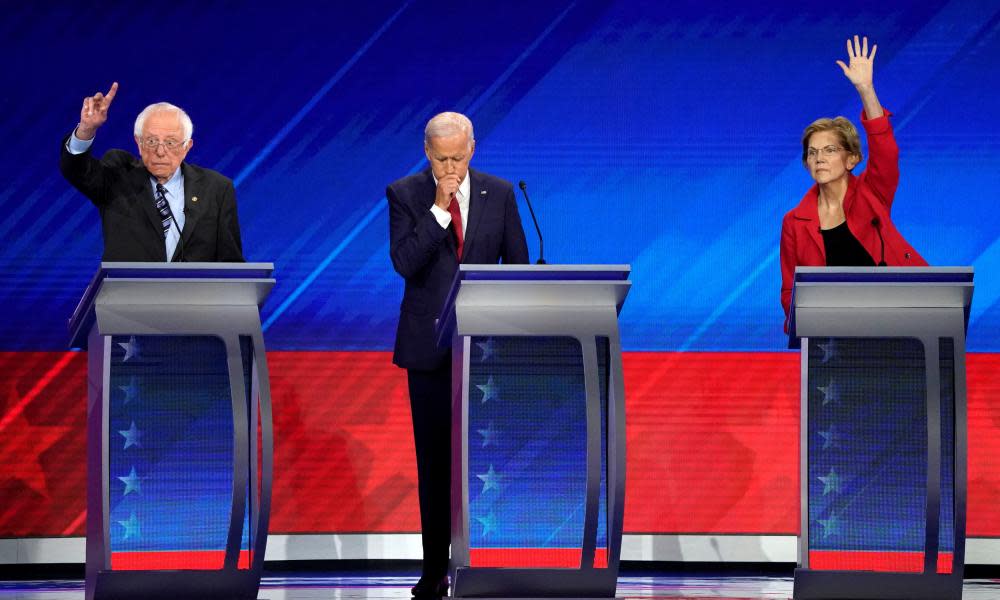Age should be no barrier to high office. Worn-out ideas are another matter

Which country has the oldest leader? Officially it is Malaysia, whose current president, Mahathir Mohamad, weighs in at an impressive 94 years. Yet the unassailable winner of this contest is North Korea, because although the nation’s supreme leader, Kim Jong-un, is a mere youth of 35, his father, Kim Il-sung (who inconveniently died in 1994), still holds the title “Eternal Leader”, making North Korea the world’s only necrocracy.
The age of national leaders, or candidates for high office, has never been automatically regarded as an issue for concern. When Winston Churchill became prime minister for the last time in 1951, he was 76. Nelson Mandela was 75 in 1994 when he became South Africa’s first democratically elected president. His unique moral authority and the historic drama of the moment meant that few people fretted about his age.
It is when elderly leaders act strangely that the age question comes up. At 70, Donald Trump was the oldest person elected to the US presidency and from his inauguration day rumours of possible senility have hung over the White House. Though, given that on an almost daily basis Trump presents with diagnostic indicators for a number of personality disorders, the initial fears that he is merely senile seem to belong to a lost age of relative innocence.
The diagnosis reportedly reached in 2017 by Rex Tillerson, then Trump’s secretary of state, was that the underlying condition that explains the president’s behaviour has nothing to do with his age and everything to with him being a “moron”. As everyone knows – and as the women and equalities minister, Liz Truss, goes out of her way to demonstrate – moronity can strike at any age.

If Trump loses to the Democrats next year, there’s a good chance that the next occupant of the White House will be even older. All three of the leading Democratic candidates – Bernie Sanders, Joe Biden and Elizabeth Warren – are in their 70s. Both Sanders and Biden are older than Trump.
When Ronald Reagan ran for a second term aged 73, his 56-year-old opponent, Walter Mondale, made Reagan’s age one of his attack lines. In 2021, both Sanders and Biden would start their first term older than Reagan was at the end of his second. If Sanders were to win the nomination and go on to defeat Trump, he would be 79 on inauguration day.
Unless the Democratic party decides to dramatically break with tradition and add an assault course or a swimwear round to the primaries, it is likely that the candidate selected to take on Trump will be a septuagenarian.
It is Biden, the frontrunner, for whom this is a problem. A string of rambling statements and garbled responses to relatively softball questions had already raised concerns, but on Thursday, during the third Democratic presidential debate, the issue of his age was unceremoniously dragged out into the open.
During a three-hour shiny floor event in Houston, all 10 Democratic candidates were in action and in an exchange on the issue of healthcare, 44-year-old Julián Castro clashed with Biden. To gasps from the audience, Castro accused the former vice-president of contradicting himself and not fully understanding his own policy, the political equivalent of losing your bus pass. “Are you forgetting already what you said just two minutes ago?” Castro asked. None of this has helped Castro but it has got pundits talking about Biden’s age and what is being called his “mental acuity”.

If Biden survives and takes on Trump in 2020, it would appear to signal that an established tradition of US politics has decisively stalled. John Fitzgerald Kennedy was 43 when he succeeded President Dwight Eisenhower in 1960. Bill Clinton was 46 in 1992 when he defeated George Bush senior. In both cases, the campaigns of the more youthful candidates emphasised the idea that the moment had come for a passing of the generational torch. The election of Trump, 15 years older than his predecessor, Barack Obama, saw the torch passed in the opposite direction.
The young, who we imagine would be most in favour of the clean sweep of a new political generation, appear largely unbothered. Both Sanders and Jeremy Corbyn became political icons among millennials. In the age of Trump and Brexit, both, for a while at least, evoked a sense of grandfatherly wisdom – at a time when wisdom of any sort was hard to come by.
The fact that the candidate whose age is under scrutiny is not the oldest suggests that the issue might not be that Biden is too old but that some of his ideas might well be. There is a feeling that he doesn’t really get the historical era we are living through. In the Houston debate, he suggested that parents should use the “record player” to bolster their children’s education, but it’s more than cultural reference points.
Biden can also appear tone deaf culturally. He infuriated many with a rambling response to a question about slavery, an issue he appeared to link to bad parenting; implying that the problems facing African Americans stem from poor parenting rather than centuries of slavery, white supremacy and structural inequality.
Then there’s his boundaries issue. When several women with whom Biden had worked came forward to say that his habit of being overly tactile had made them uncomfortable, he had to promise to be “more mindful” of personal space in the future.
We live in an age in which the task of slapping us awake to the realities of the climate crisis and the little fact that the Amazon is on fire has fallen to a teenager. At such a moment, the prospect of high office being the domain of septuagenarians can feel out of step.
• David Olusoga is a historian and broadcaster

 Yahoo News
Yahoo News 
